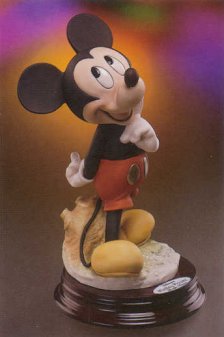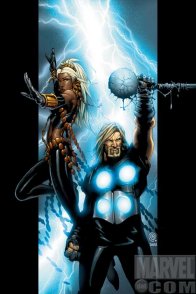| Words
and Pictures
On Jan.
15, the Supreme Court upheld a recent law extending the duration
of a copyright 20 years beyond its previous limit. This is
a major victory for companies like AOL/Time Warner and Disney
- many of whose characters would have begun entering the public
domain otherwise.
And the
media conglomerates' gain is the public's loss. The Constitution
gives Congress the power "To promote the Progress of
Science and useful Arts, by securing for limited Times to
Authors and Inventors the exclusive Right to their respective
Writings and Discoveries."
This raises
the question: does giving a corporation what amounts to perpetual
copyright protection actually promote progress? The answer:
of course not.
Corporate
characters - from Archie to the X-Men - are, by nature, static
and unchanging. From a creative standpoint this is utter suicide,
but from a business perspective it makes perfect sense. Characters
that remain essentially the same over the years are easier
to license and easier to account for on a balance sheet. The
suits don't care if that makes the characters irrelevant -
as long as they still get a decent return on their investment.
If the formula works, why risk changing it?
This is
the antithesis of progress. It dooms the characters to a slow
but steady decline into obsolescence, it turns them into "institutions"
(read: characters that everybody knows but nobody cares about),
and it keeps them out of the intellectual jungle that is the
public domain - the one place where they might actually find
a new lease on life. It also encourages companies to stop
producing new ideas and instead concentrate on rehashing and
revamping old ones.
In the
long run, this is as detrimental to the big media companies
as it is to the consumer. The companies may be preserving
the "integrity" of their characters, but what good
will that do them if nobody cares about the characters anymore?
For the comics industry - one so utterly and totally reliant
upon franchise characters for its very existence - this is
a form of slow suicide.
Thankfully,
Marvel refuses to let its flagship characters go quietly into
that good night. With the launch of the Ultimate line, Marvel
has found a way to have their cake and eat it too. The regular
MU titles get to be the corporate standard bearers while the
Ultimate line is freed to tell stories that actually mean
something.
Just compare
Avengers with Ultimates. Avengers is a fine superhero comic
that I enjoy reading every month, but I don't wait breathlessly
in anticipation for each issue like I do for Ultimates. The
latter is simply a better book because it is able to step
outside the choking confines of formulaic storytelling.
One of
the earliest doom-filled predictions about the Ultimate line
was that it would cannibalize sales of its MU counterparts.
That couldn't be more wrong. The Ultimate creators raised
the bar for their MU counterparts, but the old school writers
and artists were up to the challenge. Amazing Spider-Man,
New X-Men and Avengers are the best they've been in years.
The quality is up and so are sales. As this example proves,
a little competition can go a long way.
Bereft
of an Ultimate-style line, the sales of the DC franchise characters
are suffering. It's true that Crisis did modernize and streamline
most of DC's marquee characters, but that was over 15 years
ago and they've acquired a lot of new baggage since then.
And to be honest, Crisis left a lot of the DCU's history intact
- creating almost as many continuity conundrums as it solved.
DC needs to follow Marvel's lead and create a line independent
of the DCU where their flagship characters - Superman, Batman
and Wonder Woman - can be freed to reach their full potential.
Creative
freedom is absolutely necessary if Marvel and DC want to keep
their franchise characters - and their companies - alive through
the rest of this century. The courts have given them another
20 years of exclusive copyright. Let's hope they make good
use of it.
|







